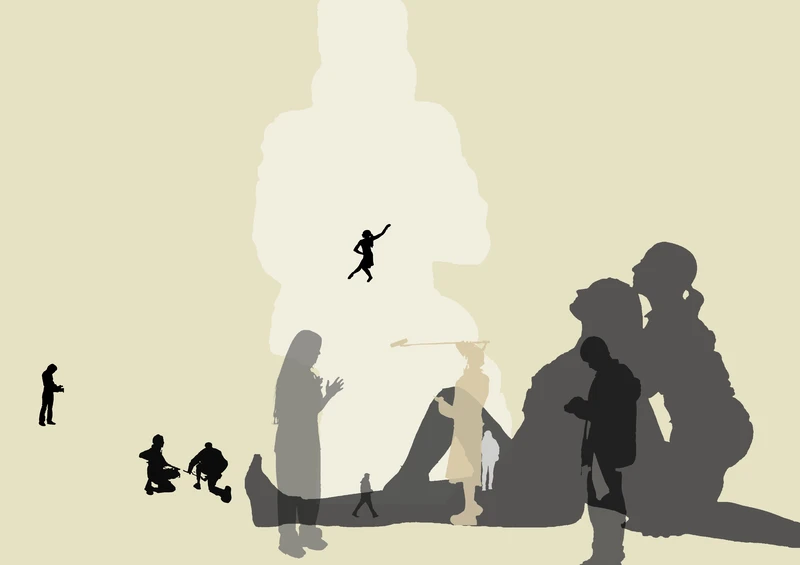Nina Cristante: The Richest Man in Babylon
21 Sep-24 Nov 2024
PV 20 Sep 2024, 6-9pm


The Richest Man in Babylon is a solo exhibition by the Italian-born, UK-based artist Nina Cristante, marking the debut of her longform film work. The film is set in a parallel reality, neither present nor future, where the artist imagines a world navigating the environmental and emotional toll of austerity measures on the body and psyche.
The exhibition continues Cristante’s exploration into control, sanity, sickness, and health, expanding the notion of ‘body’ into deconstructed architecture and theatre set, ambitiously echoing her pivotal works FITNESS POVERO (2015) and Zao Dha Diet (ZDD) (2016), where she developed exercise workouts and health routines that reflect and eliminate economic constraints, using what is readily available.
The film unfolds through a series of interconnected episodes, centring on a Movement Trainer hired by affluent international clients who seek to escape the crushing pressures of City life and the hollow demands of consumerism. Classical ballet is cited throughout the work, either through training the clients as stripped-down choreographed sequences or as the trainer’s internal moments of reflection. Hybrid leisurewear reinforces the inherent conflict between the body's natural rhythms and the rigid demands of a work-centric lifestyle, where even down time is co-opted into the realm of productivity. The line between work and life is crossed, highlighting a relentless work ethic and an inability to be present for one’s own life, as bodies unwittingly give into deteriorative disease, with apparent dissociation from the dehumanising effects of urban life.
A tension between authenticity and cinematic distancing foregrounds the film’s form, as Cristante intentionally discloses and makes obvious the manipulative contrivances of the medium with strategic pauses, accelerated footage, and glitchy flashbacks that draw attention to the film’s constructed nature. The credit lines for the film serve as a meta-commentary on the process of filmmaking, drawing structural parallels between cast and crew, surgery team and a corporate boardroom. Cristante's brief cameo appearance further juxtaposes a critical pivot, blurring the boundary between the diegetic world of the film and the real world. The Richest Man in Babylon questions the role of fiction in both film and the broader context of medical practice, where maintaining a patient's sense of comfort might require similar manipulative techniques.
By combining processes from performance exercise to the methodologies of medical diagnosis, Cristante’s probing circulates between the rehearsal studio, the waiting room, the performance space, and the operating theatre to reveal the intangible biological fascia that lies beneath skin and tissue, playing upon physical vulnerability and heightened anxiety. Characterised by fragmented fictional plots and a sense of the absurd, the exhibition’s dystopian portrayal of the city’s architecture in dis-ease witnesses a crumbling welfare state and its medical structures.
Nina Cristante lives and works in London. Selected group exhibitions include 'Ann’s Research', Essex Street Gallery, New York, USA (2022); 'Volcanoes', LIFE SPORT Project Space, Athens, GR (2019); 'For Some Future Time', South London Gallery, UK (2018); 'Lepza Ja, Zacheta', National Gallery, Warsaw, PL (2018); 'Open Workout with Nina Cristante', Akademie Der Kunste, Berlin Biennial (2016), Berlin, DK (2016); 'Condition', Showroom MAMA, Rotterdam, NL (2016); 'La scrittura degli Echi', Maxxi Museum, Rome, IT; and ‘is it polite or rude to leave the room?’, Cell Project Space, London, UK (2015). Recent solo exhibitions include 'NUM', Triest Gallery, New York, USA (2022); 'Complications', YEARS Gallery, Copenhagen, DK (2017); and 'life sport', LIFE SPORT Project Space, Athens, GR (2016). In 2022, Cristante collaborated with Dean Blunt in 'MUD' at Bourse de Commerce/Pinault Collection, Paris, FR.
Generously supported by Arts Council England